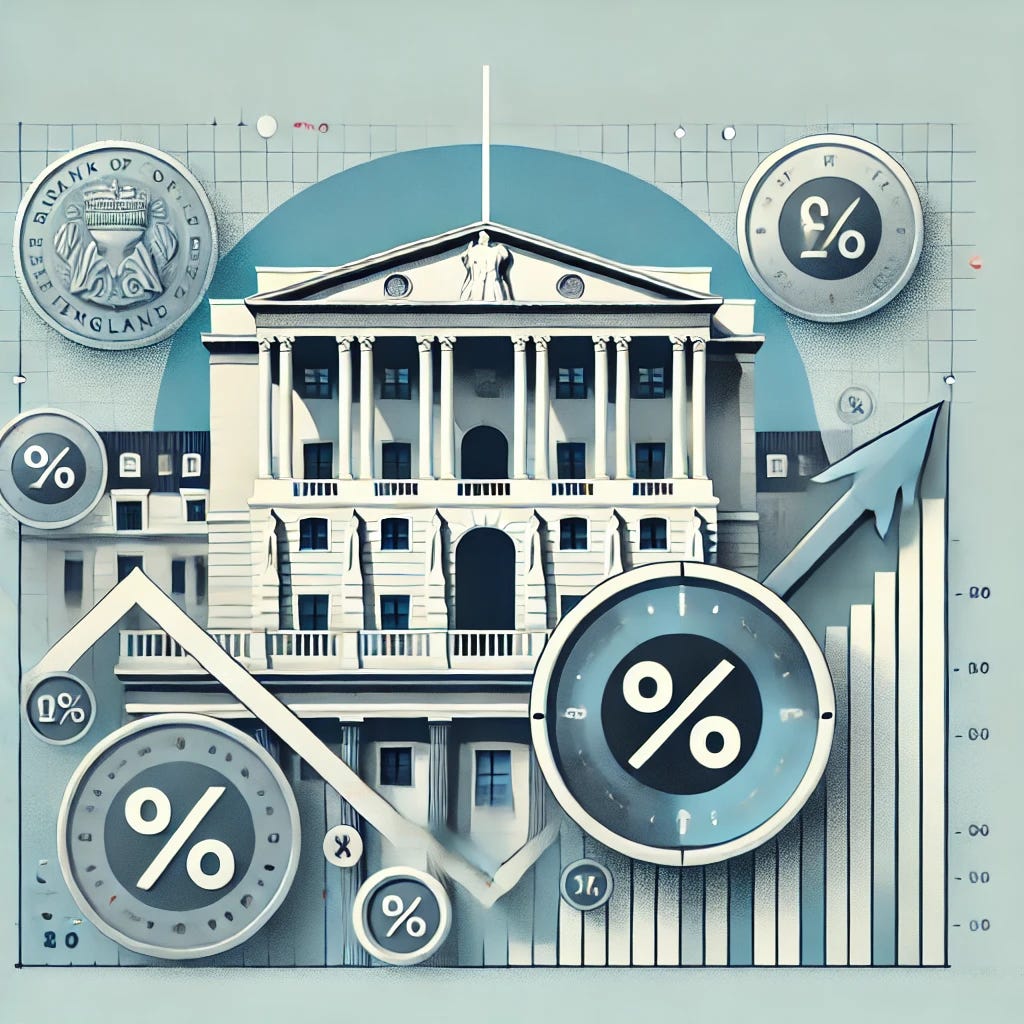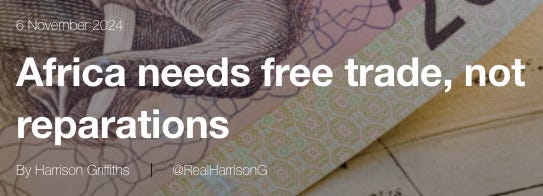Trump Returns & the Bank Cuts Rates
What will Trump's re-election mean for the world economy?
Donald Trump is to be US President once again, becoming only the second President to serve two non-consecutive terms after Democrat Grover Cleveland lost office in 1888, only to regain it in 1892.
Cleveland led the Bourbon Democrats, a movement within his party that favoured sound money, free trade, and free markets. They opposed the expansionist ‘Free Silver’ monetary movement, protectionism, and subsidies for special interest groups.
Trump's perspective on trade is a rather different one. His protectionist trade policies, including tariffs of up to 60% on China and 10% across the board, have the potential to do swift and severe damage.
As I wrote in City AM this week, the tariffs imposed in 2018 and 2019 on Chinese products imposed an estimated annual cost of $831 per American household, of which only $211 was collected in tax revenue. The Peterson Institute for International Economics estimates that Trump's new tariff pledges “would cost a typical household in the middle of the income distribution at least $1,700 in increased taxes each year.” This is one among many predictions about the potential negative impacts.
The case for free trade needs to be made again in the West. But the global picture is not all doom and gloom. Supporters of free trade should draw real optimism from proposals like the African Continental Free Trade Area agreement (AfCFTA).
The AfCFTA is an ambitious, oven-ready deal to slash 90% of all tariffs in Africa over the next decade and establish a continent-wide single market. According to our new research from the Initiative for African Trade & Prosperity (IATP), it has the potential to boost regional income by over $570bn and lift over 100,000,000 people out of extreme and moderate poverty.
The agreement does, of course, face serious challenges to its full implementation. Non-tariff barriers to trade, including burdensome border checks and paperwork, crony capitalism, and a weak rule of law in many African countries must be tackled to exploit its full potential. With the AfCFTA having been signed by 55/56 African nations and ratified by 48, the IATP and its network of partners across the continent will focus on addressing those challenges and removing the barriers to creating a richer and freer Africa.
Protectionism has kept too many Africans in poverty since decolonisation. If free trade can prevail on the world’s youngest continent, a huge step will have been taken to ensure that the fight against protectionism is won in every corner of the planet.
Harrison Griffiths
IEA International Programmes Manager
P.S. The best way to support our research and educational programmes is to become a paid IEA Insider. For a limited time, new paid subscribers will receive a copy of Steve Davies’ book Apocalypse Next: The Economics of Global Catastrophic Risks and a 15% discount.
Trump's Economic Policies, the Future of the Right, and Britain’s Conservatives | IEA Podcast, Executive Director Tom Clougherty, Director of Communications Callum Price, and Wall Street Journal Columnist Joseph Sternberg, IEA YouTube
Bank of England still too cautious in cutting rates, says IEA Economics Fellow
Commenting on the Bank of England’s decision to cut interest rates to 4.75%, IEA Economics Fellow Julian Jessop said:
“The Bank of England was right to cut interest rates again today but should move further and faster. Rates are still higher than necessary to keep bearing down on inflation, especially when the Bank is continuing to tighten policy by running down its holdings of government bonds.
“Indeed, a majority of members of the IEA’s Shadow Monetary Policy Committee voted to cut rates by a half a point rather than a quarter. Inflation is now back close to target and expected to remain there, but the full effects of past increases in interest rates and the deceleration of money growth have yet to feed through.
“The additional uncertainty and market volatility triggered by the Budget and Trump’s victory had prompted some to speculate that the MPC might hold off today. Delivering the rate cut that almost all had expected should therefore help to reassure households, businesses, and investors.
“The Bank has also endorsed the OBR view that the additional spending and borrowing in the Budget will provide a temporary boost to growth and inflation. This could slow the pace of rate cuts in future, though the Bank stuck to its guidance that rates will fall ‘gradually’ (perhaps a quarter point every three months, taking the Bank rate to 3.75% by the end of next year).
“However, the Bank’s forecasts are based on assumptions about the path of market interest rates which already look too optimistic. The increases in taxes and other business costs in the Budget, compounded by the hit to confidence, should also limit any upsides to growth or inflation.
“The Bank acknowledged the uncertainties here, implying rates could still be cut more quickly. But there is a clear risk that the MPC is too slow to respond.”
“Bank of England too cautious on rate cuts, says think tank”, Julian Jessop quoted in the Telegraph.
Interest rates: Bank of England slashes base rate to 4.75% in good news for mortgages, Julian Jessop quoted in the Express.
Julian’s comment was also quoted in the Wealth Briefing, East Midlands Business Link, AOL, North East Post, Yorkshire Times, and Mahalsa.
News, Views & Upcoming Events
"It’s Donald Trump’s world, and we’re just living in it”, IEA Senior Education Fellow Steve Davies, CapX
Would a vaping ban bring gangland tobacco turf wars to Britain?, IEA Head of Lifestyle Economics Christopher Snowdon, The Times
Trump tariffs threaten billions in British exports, IEA International Programmes Manager Harrison Griffiths quoted in Politico
Christopher Snowdon: Time to call out Labour’s version of the last government’s ‘least conservative policy’, IEA Head of Lifestyle Economics Christopher Snowdon, Conservative Home
Free trade could lift over 100 million Africans out of poverty, highlights new research
The Initiative for African Trade and Prosperity, a project of the IEA and Vinson Centre, has published a paper on the African Continental Free Trade Area (AfCFTA) this week.
Full implementation of the African Continental Free Trade Area (AfCFTA) is projected to boost regional income by $570 billion by 2035, lifting over 100 million people out of poverty.
The potential gains to Africa have been described as “colossal” by trade expert and former MEP Lord Hannan of Kingsclere.
The impact of the AfCFTA on African wealth would be far greater than “more foreign aid or reparations”, according to IATP Founder Alexander Hammond.
If you’re interested in learning more about the Initiative for African Trade and Prosperity, check out the IATP website!
“Despite Trump’s tariffs, free trade is still the future”, IEA International Programmes Manager Harrison Griffiths, CityAM
“Africa needs free trade, not reparations”, IEA International Programmes Manager Harrison Griffiths, CapX
The paper was also covered in YahooFinance, Head Topics, OilPrice, Baystreet, Xangdau, Miglioverde, and PressBee.








